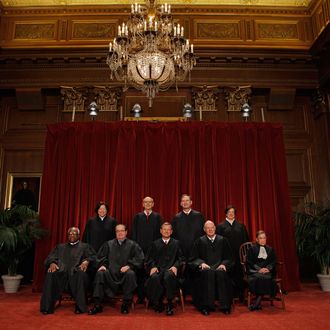
It’s now been well over a month since the expiration of Donald Trump’s self-imposed deadline for coming up with a list of candidates from which he would choose Supreme Court nominees, including the one he would name right away to fill the seat of the late Antonin Scalia. When asked about the list, Trump said he thought it would be ready to be released before the convention.
This is not a promise conservatives are going to let him ignore perpetually, and conversely, there’s no particular evidence he cares enough about constitutional law to make this a serious bone of contention.
But, in fact, conservative fears about Trump’s lack of fidelity to their supreme value of limited government could lead to demands for truly radical Court nominees who embrace the idea that right-wing judicial activism is needed to restrain the executive and legislative branches alike.
We are already hearing arguments from conservative legal circles that an atmosphere of lawlessness associated with the Court’s failure to kill Obamacare has contributed to the frustration and extremism reflected in Trump’s successful drive for the GOP presidential nomination. And some of the same critics point accusingly at Trump’s long-standing support for widespread use of the power of eminent domain as showing his contempt for property rights and willingness to use government aggressively.
So it’s not enough to say that conservative legal activists don’t trust Donald Trump any more than other conservatives do: They actually believe he’s a prime example of a politician that judges need to restrain without the deference to the political branches of government that conservatives used to believe in (and that Chief Justice John Roberts exhibited in allowing Obamacare to survive).
And thus: Regular old-school “judicial deference” conservatives like Roberts will not be acceptable to a lot of conservative opinion leaders, particularly coming from Trump. You can expect more and more demands for Justices who share the “constitutional conservative” belief in absolute property rights that permanently debar Congress and the president alike from enacting or administering social-welfare programs or business regulation. This was the philosophy supported by the Court during the early-20th-century period when a chain of decisions begun by Lochner v. United States stymied progressive legislation until FDR’s threat of court-packing and then turnover in justices forced its abandonment.
There’s now a powerful movement in conservative legal circles to bring back Lochner, and there’s probably no quicker route to its restoration than a Trump administration trying to buy favor with those on the right who fear the Donald’s tyrannical tendencies.
If and when Trump releases his SCOTUS prospect list — which he’s promised he will prepare in consultation with the Heritage Foundation — there are a couple of names to look for in particular. One is Texas Supreme Court Justice Don Willet, an outspoken neo-Lochner advocate. Another is Utah Senator Mike Lee, who makes no bones about his belief that the New Deal was and is unconstitutional. And still another might be Lee’s best friend in the Senate, Ted Cruz, if he patches things up with Trump and decides the bench rather than the White House is his destiny.
For progressives, the thing to comprehend is that there are worse things that could come from Trump Supreme Court nominations than the expected fifth vote to restrict or overturn Roe v. Wade or to cripple public-sector unions, terrible as either of those things would be. Precisely because Trump is a loose cannon, he may be convinced to promise his new conservative friends what they really want on the Court: Justices who want to turn the clock back not just to 1972, when abortion was illegal in most states, but to the early 1930s when what we think of as the social safety net was considered a radical and unconstitutional idea.






























